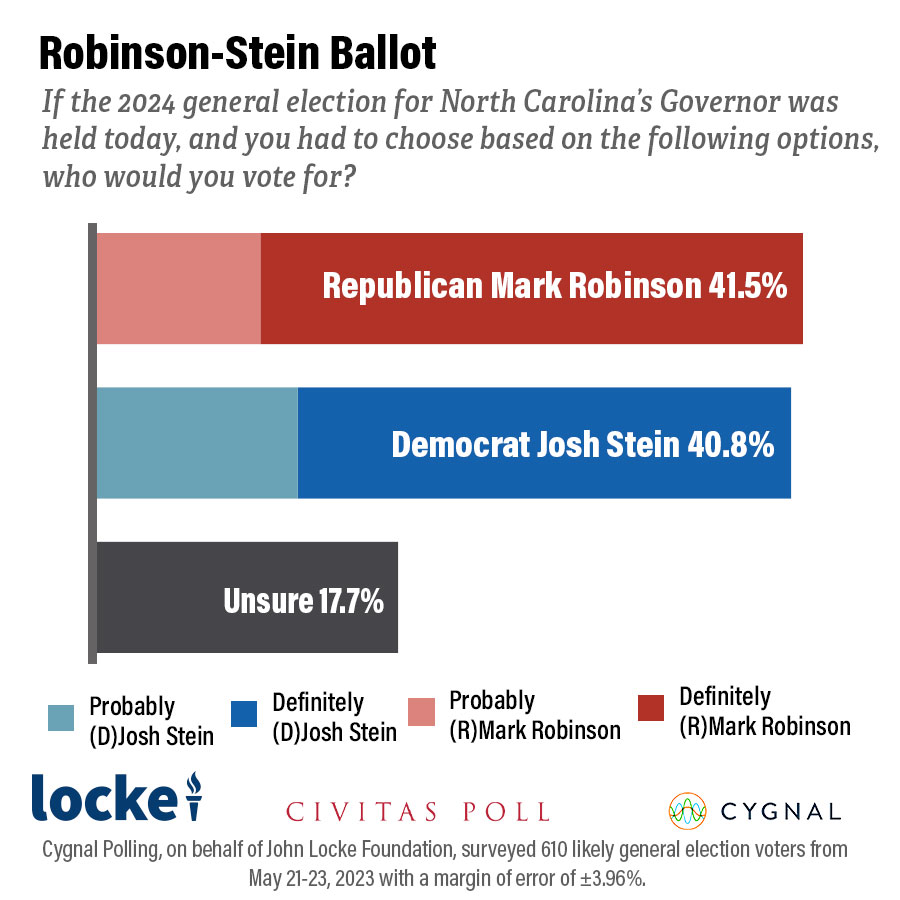In a hypothetic matchup for governor in 2024, Lt. Gov. Mark Robinson is the only declared Republican candidate who would best Democrat Josh Stein, the current attorney general. Robinson would take 42% of the vote to Stein’s 41%, according to a Civitas Poll released May 25. The difference is well within the poll’s margin of error.
The other two Republican candidates who have declared for governor perform more poorly against Stein. State Treasurer Dale Folwell would lose 34% to 39%, while former congressman Mark Walker would secure 37% of the vote to Stein’s 39%.
The poll did reveal that a noteworthy percentage of the GOP primary electorate remains undecided about the candidates.

Robinson announced his bid for the GOP gubernatorial nomination April 22, while Folwell threw his hat into the ring a month earlier. Walker entered the primary May 20. On the Democrat side, Stein is the only declared candidate.
“The race for the governor’s seat is a tight one so far,” said John Locke Foundation president Donald Bryson. “But with so many undecided voters, there is definitely room for candidates to gain ground by making a compelling case to the people of North Carolina. The calculus could also change if another Democrat throws their hat in the ring.”
The Civitas poll also revealed that pessimism surrounding the direction of the country reached a new recent high, with 77% saying the U.S. is on the wrong track and just 16% saying right track. That marks the highest level of dissatisfaction recorded in the Civitas Poll since President Joe Biden took office.
Biden’s approval rating reached a nadir of 32% — also the lowest point recorded by the Civitas Poll — with 57% disapproving. Gov. Roy Cooper remains in the green on his approval rating, with 44% approving, 38% disapproving, and 13% neither approving nor disapproving.
A national push on the part of Democrats to lambast Republicans for a new pro-life law that creates additional abortion restrictions doesn’t appear to have translated to hurting the GOP on the generic ballot. In fact, the GOP has shored up its advantage. Forty-seven percent would choose a Republican on a general ballot for General Assembly, while 40% would pick a Democrat. In August, those numbers were tighter at 47% and 44%, respectively.
In a hypothetical generic U.S. Congressional race, Republicans maintained a smaller lead with 46% of voters favoring them, while 42% favored Democrats.
In line with other polling, voters continue to believe that requiring an ID for voting makes sense. Sixty-six percent support the requirement, and 96% said that they already possessed some form of official ID, such as “an unexpired North Carolina driver’s license, United States passport, or state government employee ID card.” Moreover, requiring a voter ID would make 63% of respondents feel “more confident in the fairness and accuracy” of state elections.
Respondents sent mixed signals on the state’s ABC system for regulating and selling alcohol. Fifty percent said they were “satisfied” with the ABC system and 22% dissatisfied, but 44% would support the privatization of alcohol sales, compared to 22% opposed.
On school choice issues, 75% say “a child’s parents or guardians” are best suited to make educational decisions, while 11% would pick local school boards and 7% the State Board of Education. Fifty-two percent said they support the recent move by the N.C. House to expand Opportunity Scholarships to all families, regardless of income, while 22% were opposed.
The poll was conducted May 21-23 and surveyed 610 likely general election voters.